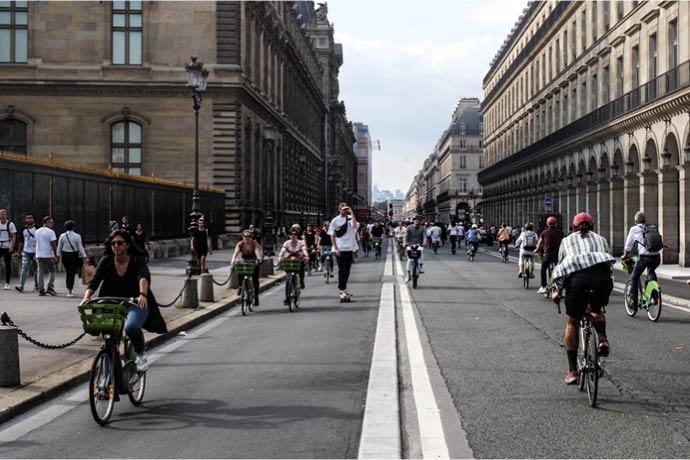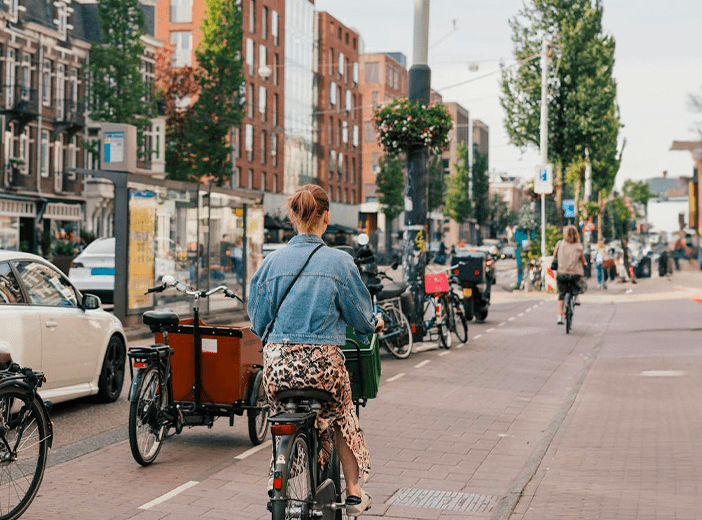How Cities Become Smarter Through Better Use of Data

This blog post draws on real-life examples to demonstrate how cities use data, one among many technological tools, to build better cities and deliver smarter policies.
Today, leaders are equipped with ever-changing technological tools that drastically alter the relationship between urban spaces and the communities that they host. Being smart in this era often depends on efficiently using technological advances to provide your residents with the best possible living conditions. Smart cities do not necessarily provide a technological response to every challenge they face. They do however try to use the right technology in the right way to best serve their residents.
If you are interested in learning more about the impact of technology on local governments, we recently published an interview with Ben Green, author of The Smart Enough City: Putting Technology in Its Place to Reclaim Our Urban Future. This blog post draws on real-life examples to demonstrate how cities use data, one among many technological tools, to build better cities and deliver smarter policies.
Building a Strong Data Culture
As Ruthbea Yesner, smart cities specialist at the International Data Corporation (IDC), rightly put it in an interview previously published on our blog: “Data itself is not a competitive differentiator, it is what a city, or supplier to a city, does with data that creates that differentiation.” The first step to build a smarter city through better data usage is to create a strong data culture within your organization. Cities are made up of a number of units which all have their own way of doing things and their own information silos. Bringing all of your data in a single platform to collect, prepare, gather, publish, visualize, analyze and share your data will help you build a more collaborative approach to data sharing.
Actively Engaging Citizens
A second step to make the most out of your data is to actively engage your citizens in the process. Smart city initiatives aim to share data the best they can with their citizens to involve them in the decision-making process. Such initiatives are not just about “forcing technology and innovation on citizens, but rather using these things as tools to solve real-life problems”. [1] Organizing, visualizing and sharing data efficiently helps cities to understand their residents’ needs and concerns and to develop policies that will align with their residents’ expectations.
Example: the City of Paris
The City of Paris (France) launched a dashboard displaying important data about city initiatives to improve living conditions for Parisians. The data is organized according to three indicators: 1) making living together easier includes anything from data about bulky waste pickup to areas treated for rats 2) caring for all gathers datasets such as the number of new social housing flats and 3) building the world of tomorrow provides relevant data on innovative and ecological projects in the city. Presenting this data in dashboards enables the City of Paris to account for its public policies and inform residents about ongoing projects.
Example: the German town of Dormagen
Another example of successful citizen engagement through data sharing can be found in the German town of Dormagen. The town council manages a number of independent micro-projects using its public data and publishes them through its data sharing platform. The town recently introduced the application Mängelmelder Dormagen, which enables citizens to report public infrastructure issues, such as a missing sign, a broken traffic light, potholes, all in real-time. Data from the application now feeds into the town’s public data portal and is automatically updated. Residents can easily access information regarding public infrastructure issues and the town council’s response to each situation. Dormagen’s example shows how cities can leverage data sharing tools to involve residents in the management of their urban space.
Designing Evidence-Based Policies
Like many cities, Bristol is looking for ways to implement more environment-friendly policies. The city has been working hard in recent years to improve air quality by finding better ways to encourage residents and visitors alike to use public transport. To reach this objective, Bristol developed a customized dashboard to monitor real-time air quality in the city. Stakeholders can clearly visualize, share, and analyze levels of harmful pollutants. The council can now use this evidence to support its policies around air quality.
Enabling Urban Innovation
Example: Smart mobility in the City of Salinas
The City of Salinas recently launched an open data portal to explore innovative solutions that would help people better navigate the city. By launching its portal with Opendatasoft, Salinas benefitted from Opendatasoft’s partnership with Waze – a free, real-time crowdsourced traffic app. Through Opendatasoft’s one-stop hub, the city can seamlessly collect, harmonize and share publicly available traffic data through the Waze Connected Citizens Program. The Waze Connected Citizens Program gives local governments a fresh look at real-time road activity. The program provides cities with the opportunity to harness real-time driver insights to improve congestion and make better informed urban planning decisions. The two-way sharing initiative provides Salinas with a powerful tool to help improve data accuracy and generate insights on how residents navigate their roadways, where problems arise, and how to fix them.
Example: Indigo’s Smart Parking Initiative
Salinas’ partnership with Waze is not the only example of a public-private initiative that aims to make cities smarter. Indigo, a world leader for urban mobility solutions, supports a number of cities to design smart parking solutions. As cities are constantly looking to improve how cars are parked on streets, Indigo realized that it could easily leverage the data it collects on parking and mobility to help cities. The company organized a catalog of raw parking data, which it used to build an interactive platform with different visualization options to quickly illustrate major trends or issues in parking management.
Cities can now access data about their operations and display interactive dashboards, maps, charts and metrics to monitor parking management, enforcement and usage via a dedicated data portal. The datasets that Indigo shared tackle issues including real-time parking availability, parking occupation rate and occupation rate forecast, expected revenue streams and usage time breakdown.
Whether it is through an open data portal or through more elaborate partnerships with city operators or private companies, cities are constantly reinventing the way in which data can help them provide better living conditions for their citizens. This blog post only scratches the surface of how better data usage can help you build a smarter city.

Every municipality and its stakeholders will benefit from effectively sharing data. However smaller, resource-constrained cities with limited budgets can find it difficult to start their data sharing programs - we look at how partnering with other local organizations can help them begin.



